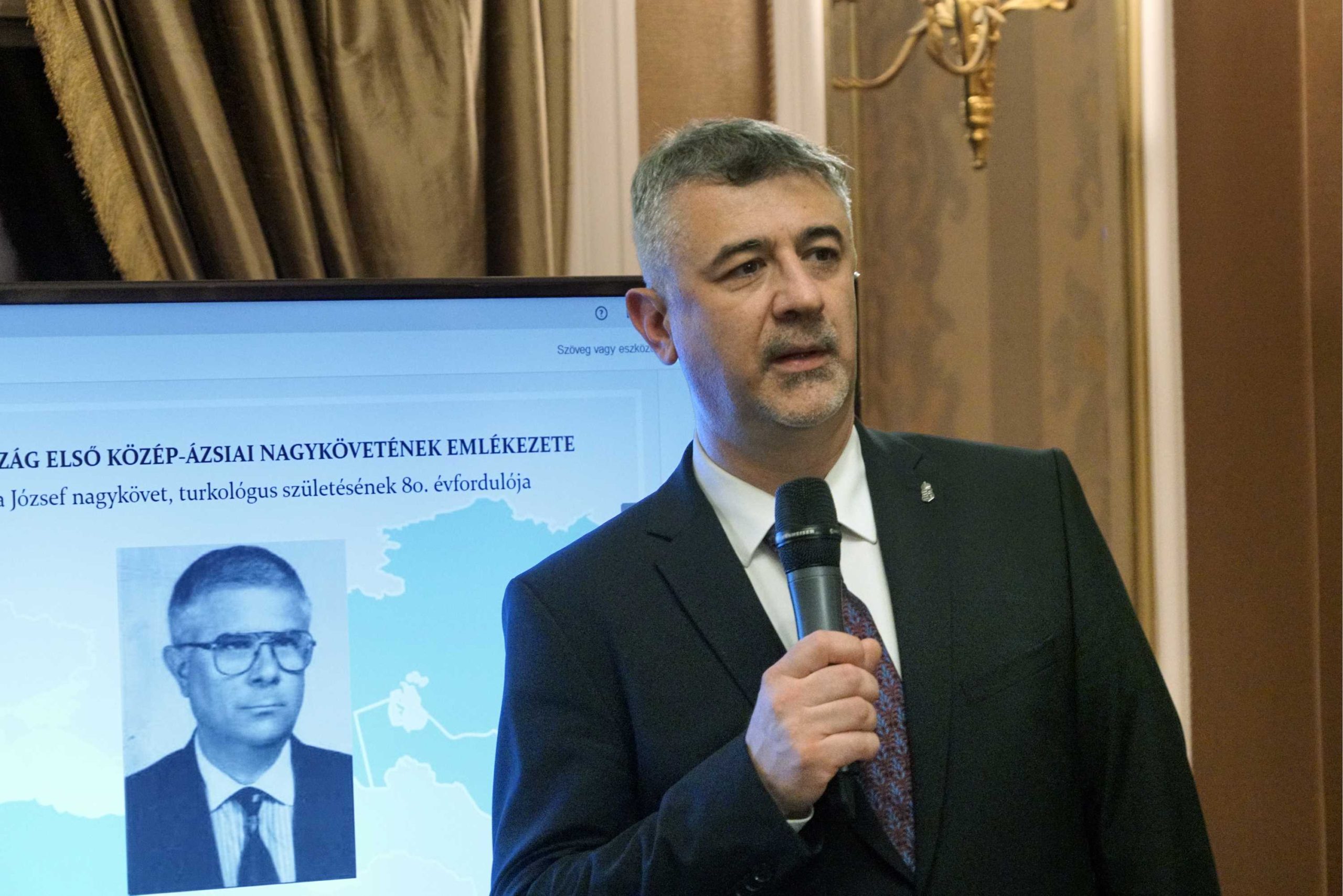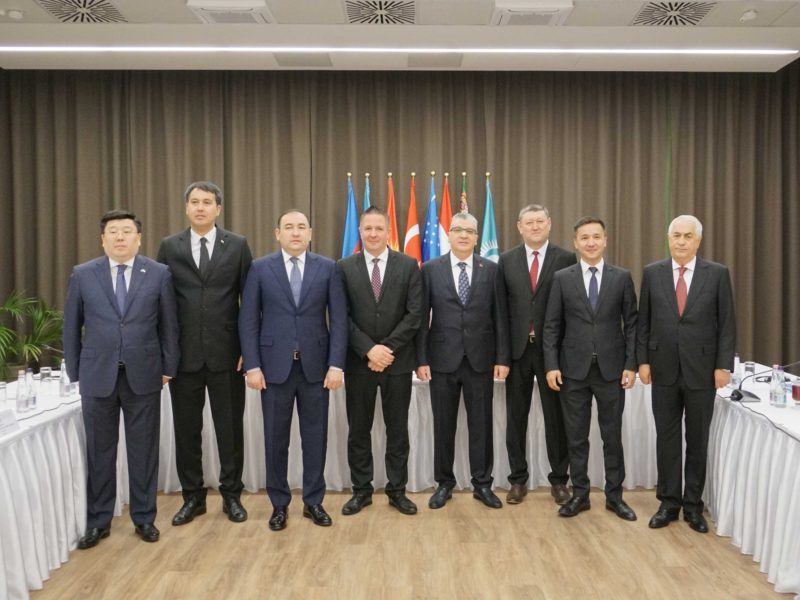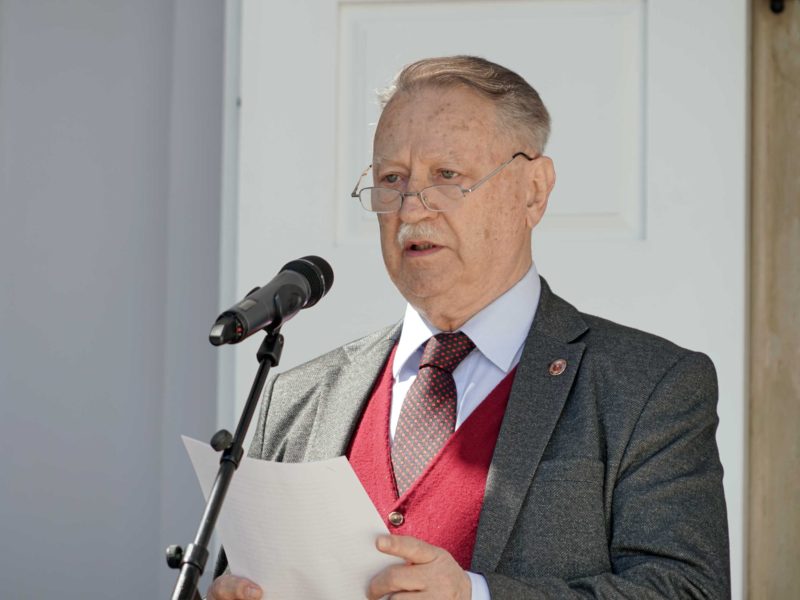Torma József, the Turkologist, diplomat, the first Ambassador of Hungary to Central Asia would have turned 80 in October this year. The Representation Office of the Organization of Turkic States (OTS) organized an event in the Ybl Villa to commemorate his work. This was attended by the members of his family, his friends, former colleagues, as well as the Ambassadors of the member states of the OTS, and the representatives of the diplomatic corps.
The guests were welcomed by Talaibek Kydyrov. The Acting Director of the Representation Office in Budapest reminded them of the fact that it is symbolic that the commemorative event had been the idea of the late Ambassador János Hóvári who, unfortunately, passed away in August. Talaibek Kydyrov underlined that we are paying tribute to the memory of József Torma, a diplomat, a Turkologist and a teacher whose person is highly respected not only in Hungary but in the whole Turkic world.
The first speaker at the event was former Foreign Minister János Martonyi who remembered a friend, a former classmate in Szeged and also a colleague at the Foreign Ministry. He underlined that József Torma was liked by everyone, his humanity was exemplary, and he was a warm-hearted, sympathetic man who was ready to help everyone. “He was the best in Latin and Russian in our class in Radnóti High School, a real talent for foreign languages who later learned Turkish and other Turkic languages as well.” At the dawn of the change in the political system in Hungary, József Torma found himself in the Foreign Ministry after a long career in teaching and research. Here his command of languages, his great experience in the region of Central Asia “put him finally where he had to be put.” After serving in Istanbul and Ankara for a few years, József Torma was appointed to open the Embassy of Hungary in Kazakistan – the first in Central Asia.
As András Kelemen stressed, “this opening was extremely important politically, economically and culturally, and it has become significant up to the present day. The former State Secretary in the Foreign Ministry played a personal role in making József Torma the first Hungarian Ambassador to Kazakistan, who from February 15, 1994 was accredited from Almaty to both Kyrgyzstan and Tajikistan.
Even before he was appointed Ambassador, the work of József Torma was characterized by dynamism, organization without opportunism, as well as research and writing. Ambassador Ernő Keskeny recalled that from the point of view of diplomacy, the early 1990s – after the collapse of the Soviet Union and the birth of the new states – were extremely exciting. While the command of foreign languages and experience in the region of József Torma was unprecedented, the experts dealing with the region could speak only Russian. “The Antall Government issued a Note Verbale already in December 1991 which stated that Hungary would establish diplomatic relations with all the former member republics of the Soviet Union. The work of diplomacy has come to fruition by the middle of the 1990s when the first Hungarian Embassy in Central Asia could be opened. József Torma was obviously a genius for languages who learned the Turkic languages, including Bashkir, who wandered through the villages of Bashkiria, a place that he came to like more than anything.”
The former Turkologist colleagues of József Torma also made remarks, pointing out his dedication and unprecedented professionalism. Professor Sándor Papp from the University of Szeged revealed that the research trips by József Torma to Bashkiria between 1978 and 1991 are extremely well documented. “He perceived of the culture of Bashkiria from within, he had materials that had never been collected by anyone.” Éva Nagy–Kincses emphasized that József Torma was not content with research and publishing – as an ethnographer, he covered the whole region where he met the local people with whom he spoke in their native tongue. In her remarks, Mária Ivanics pointed out that a rich photo documentation of the trips made by József Torma to Bashkiria and later to Central Asia is available. It offers an indispensable pivot to do research into the cultural relics that –partly – no longer exist.
Dávid Somfai Kara, who moderated the event, recalled the trips to Central Asia that he had made together with József Torma. These played a decisive role in his embarking on his career as a Turkologist and researcher. The Associate Fellow of the Research Institute of Ethnography of the Hungarian Academy of Sciences shared with the participants the message by Zubaila Musina. She recalled the her grandfather, Tagan Galimjan worked as a close aide to Ahmet-Zeki Velidi Togan, the President of the Anti-Bolshevik, independent and democratic Republic of Bashkiria that existed during WWI and the civil war in Russia. She managed to learn that her grandfather had settled down in Budapest only from the lecture held in Ufa by József Torma and István Mándoky Kongur in December 1990.
The closing remarks at the event were made by Tamás Torma, the current Ambassador of Hungary to Baku. His father became interested in the East primarily because as a child he had been reading the log of his grandfather, János Torma. He had been working as a vet of the stud of horses in Kisbér (Komárom County), and delivered horses to maharajas in India, as well as to the courts of Emperors. In 1889, while accompanying these horses, he made his way to India, China and finally to Japan. Within the research into the East, the attention of József Torma was more and more diverted to the origins of the Hungarians and learning about the Bashkirs. During his diplomatic postings to Türkiye and then to Central Asia, he continued his research work. This was – as in the case of almost all Hungarian Turkologists – motivated by trying to find our brothers and acquiring the deepest possible knowledge of their culture. The fact that in 2018 Hungary became an observer state in the Organization of the Turkic States also meant the success of the Hungarian Turkologists, among them the decades-long work of József Torma.
József Torma was born in Kecskemét on October 5, 1943. He started his university studies at the Faculty of Arts of the University of Szeged from which he graduated as a high school teacher of German and Russian. On the basis of his command of Russian, he tried to learn other Slavic languages. In such a way, motivated by the historical friendship between Hungary and Poland, he learned Polish on his own, and spent his summers as a student between 1963 and 1967 by learning more and more about the country. Later he worked as a guide in Cracow and Warsaw, and within a few years he was doing simultaneous Hungarian – Polish interpretation to make ends meet. In 1975, – because of his old affection for the East – he embarked on Altai Studies at the Attila József University of Sciences in Szeged. From 1967 to 1991 József Torma was working as a high school, college and university language teacher. From 1982 he was a senior language teacher, and from 1986 the Director of the Institute of Foreign Languages.
He was also dealing with the problems of reforming language teaching at the university level. Within that, he spent energy on changing the teaching of Latin, as well as on working out a national system of making the teaching of Russian optional. However, besides these jobs he dedicated himself to his chosen vocation: not sparing himself, his free time and his own costs, he made testing trips to the region of the Turkic people in Asia.
In 1981 József Torma defended his MA dissertation, the topic of which was the classification of Bashkir dialects with a historical perspective. In 1986, when Glasnost was declared, he was one the first researchers to visit the Soviet member republics and one of the Autonomous Turkic Republics, Bashkiria. He acquainted himself with all the three branches of Bashkirs, and he learned the various dialects by going from one village to the other. He also took plenty of notes in order to process the material that he had collected. It was in 1998 that he defended his PhD dissertation with the title “The Current System of the Magic Elements of Popular Curing in Bashkiria.” After his death, as a recognition of his research into Bashkiria, and not in the least of his role in reawakening of the Bashkir national self-consciousness, on October 9, 2002 his memorial plaque was unveiled in Ufa. This is the first Hungarian–Bashkir–Russian language plaque to a foreigner on the wall of the Institute of History, Linguistics and Literature, the venue of the research of József Torma.
József Torma put great emphasis on his studies on the Turkic people and languages should be published not only in Hungarian and the main world languages, but in Turkish, Bashkir, Kazakh, Kyrgyz, Altai, Khakas and other Turkic languages. As a recognition of his efforts, two Kazakh journals – in 1994 Ana tĕlĕ (”Mother Tongue”), in 1996 Parasat (”Intellectuals”) – awarded József Torma the ”Prize of the Standard Bearing Author of the Year.”
Between 1994 and 1997 József Torma focused his attention on examining Cuman – Kazakh congruities, as well as the charting of the connections of the Hungarian folklore and that of the Central Asian peoples. He published several articles on hunting with an eagle, done by Turkic people in Central Asia, and he also did detailed research into the work of the Kazakh poet and thinker, Abaj Konanbajolit.
József Torma suffered from a rare illness from 1996 which caused him terrible pain in the last months of his life. He passed away on April 23, 2000, at the age of 57.



